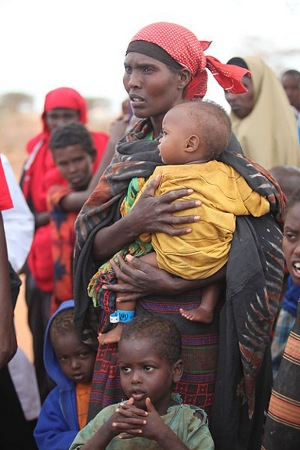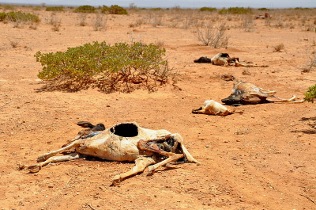The Malthusian Trap
The principle that there is a perpetual tendency in the race of man to increase beyond the means of subsistence is usually attributed to political economist Thomas Robert Malthus. The Malthusian Trap is the theory that, as population growth is ahead of agricultural growth, there must be a stage at which the food supply is inadequate for feeding the population.

This was originally devised by Malthus in An Essay on the Principle of Population in 1798, arguing that food supply expansion is linear whereas human growth is exponential.
World's richest to blame?
Aid agencies have accused the world's richest countries of "wilful neglect'' in failing to fund appeals to save millions of Africans from famine.
Somalia's neighbour Djibouti yesterday appealed for $US21 million ($A19.5 million) from international donors to help deal with a drought that has left about 120,000 of its 900,000 citizens vulnerable.
A human tragedy
Nearly 11 million people are at risk of starvation in the Horn of Africa, including 500,000 children who are suffering from imminent, life-threatening severe malnutrition, according to UNICEF. 1.6 million additional children under five years old are severely malnourished.
“This humanitarian crisis is caused by an unprecedented drought in the region, where families traditionally rely on livestock and farming for food. Food prices have spiked, crops and livestock are failing, and rivers are at their lowest levels in recent memory”.
Nothing is being said about their unsustainable population growth, that this aid is supposed to compensate for.
Unsustainable and unhindered population growth
High levels of population growth is exacerbating food shortages in Uganda, Ethiopia, Kenya and Somalia. Unless we address population growth and provide reproductive health with aid responses, the children we save now will be bringing their families to the same feeding centres in a few years time.
Addressing population growth has to be the most important goal of the human race.
The director of the Australian Demographic and Social Research Centre at the ANU, Professor Peter McDonald, says that the amount of funding for family planning programs has reduced dramatically over the years.
The population of Africa is expected to triple by the end of the century, and lack of access to or knowledge of family planning and contraceptives is a serious issue around the world that needs to be addressed.
Aid, community action and access to family planning must go hand in hand else it is a matter of throwing funds at the inevitable problems further down the track.
The economies of these countries are doing badly and standard of living are ranked among the lowest in Africa. Since the severe drought of 1984 that was reported to have caused the death of more than a million people in Ethiopia and Eritrea, these countries have not been able to meet their household food requirement.
Malthusian Trap is a consequence of human numbers outstripping the ability to increase food production.
Horn of Africa's human population growth that is estimated at 3.2% annually. Nearly half the current population is under 15 years of age thus unable to contribute to the economy. The increasing population continues to put pressure on the already fragile land.
No positive correlation between wealth and population size
Nigeria, Africa's most populous country at 158 million, is expected to grow to 730 million by century's end, making it larger than Europe's projected population of 675 million.
Together the population of 11 African nations - the Democratic Republic of Congo (DRC), Egypt, Ethiopia, Kenya, Malawi, Niger, Sudan, Tanzania, Uganda and Zambia is expected to reach 2.4 billion by 2100, representing about a quarter of the world's population at that time.
The population of Ethiopia has doubled from 46 million to 84 million since Sir Bob Geldof raised 150 million in aid. The private donors should stop until they agree to manage their family sizes, and destinies.
The obvious is not applied to human population size
We know not to put more sheep or cattle into a paddock than there is feed to make them healthy, yet people and non government organisations still continue to deny human population sizes in addressing or recognising the problem.

The raging monster upon the land is population growth. In its presence, sustainability is but a fragile theoretical construct. To say, as many do, that the difficulties of nations are not due to people, but to poor ideology and land-use management is sophistic. Harvard scholar and biologist E.O. Wilson
Unlimited population growth cannot be sustained; you cannot sustain growth in the rates of consumption of resources. No species can overrun the carrying capacity of a finite land mass. This Law cannot be repealed and is not negotiable. Dr. Albert Bartlett, www.albartlett.o rg , University of Colorado, USA.
It took nearly 130 years for the world population to grow from 1 to 2 billion, but the recent growth from 6 to 7 billion has occurred in only 12 years. Such is the “success” of our own species, we could easily end up being victims of it!

Add comment